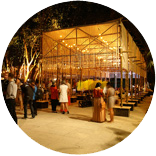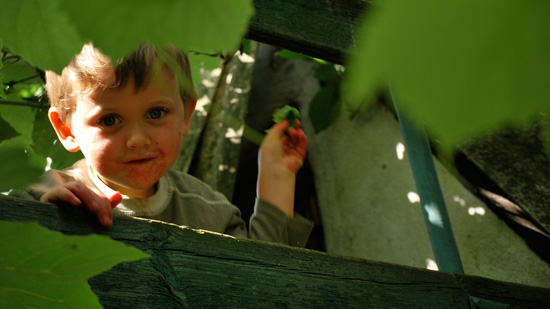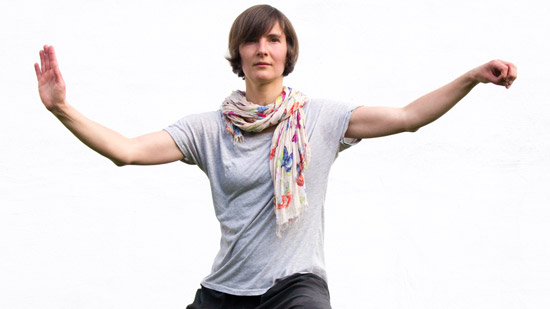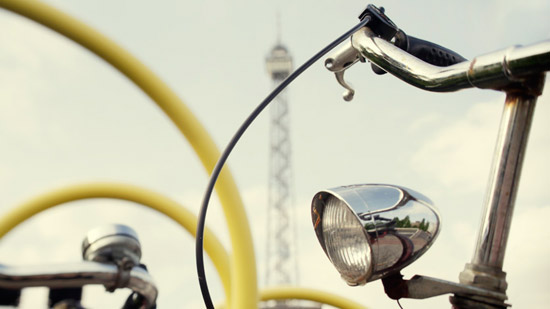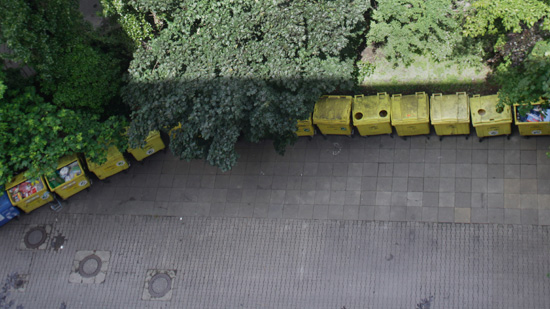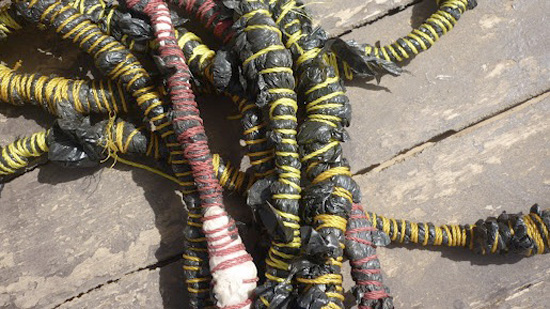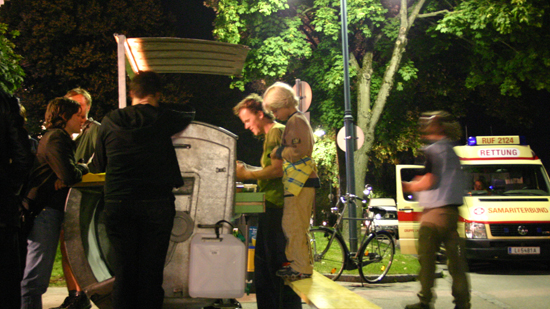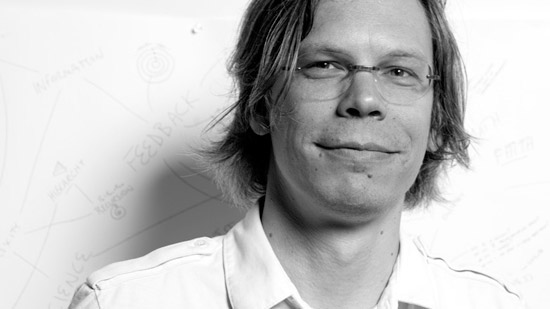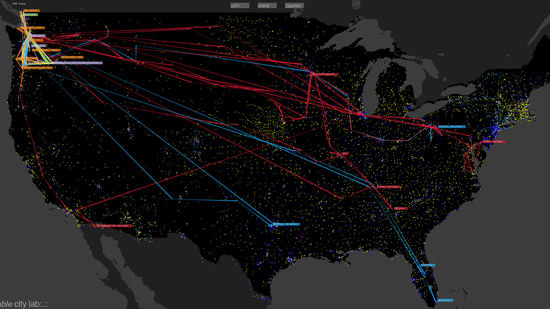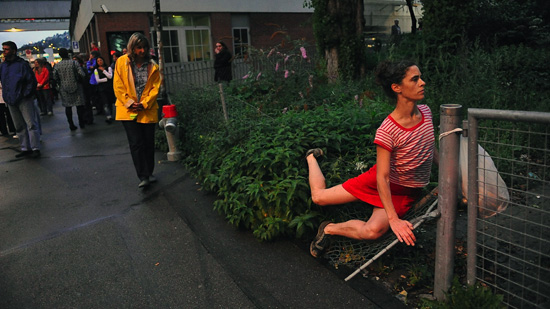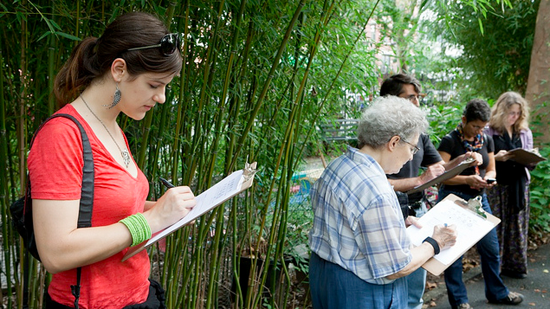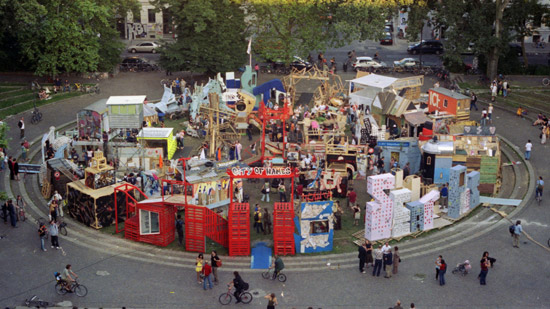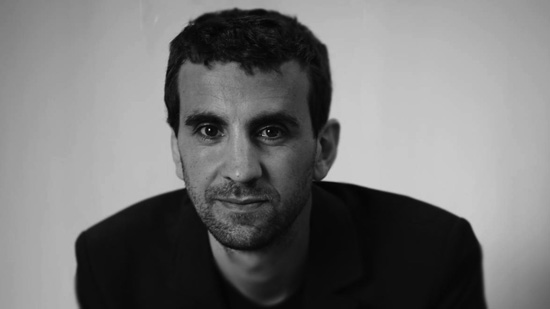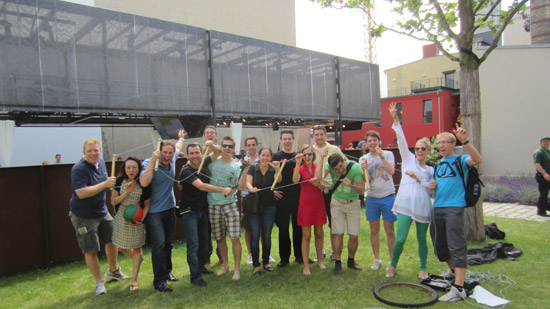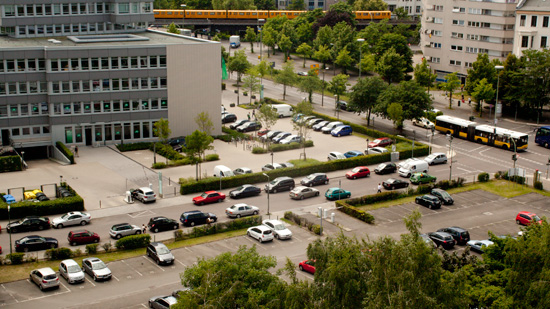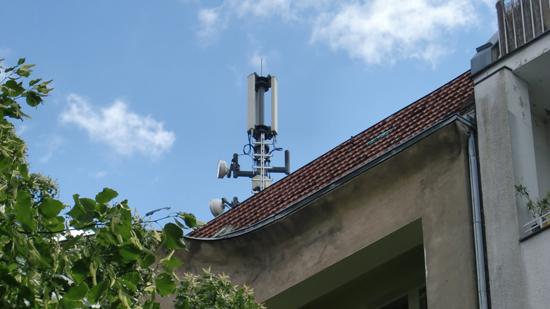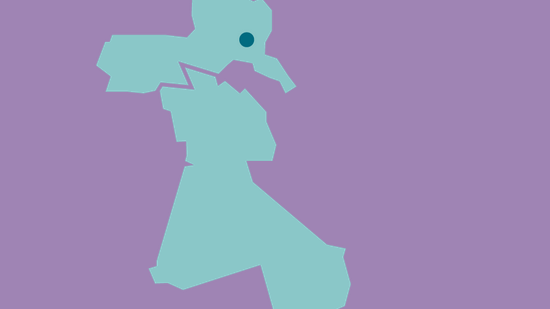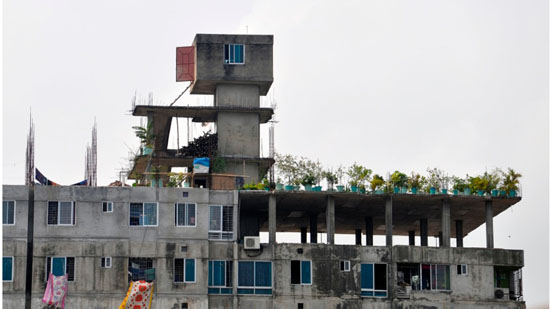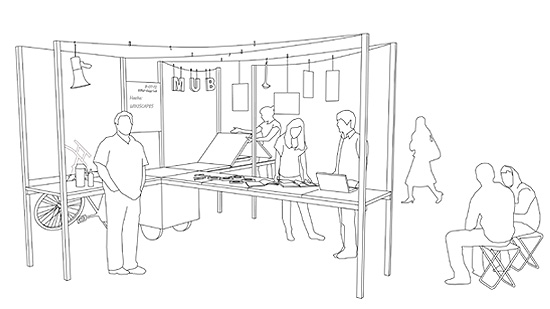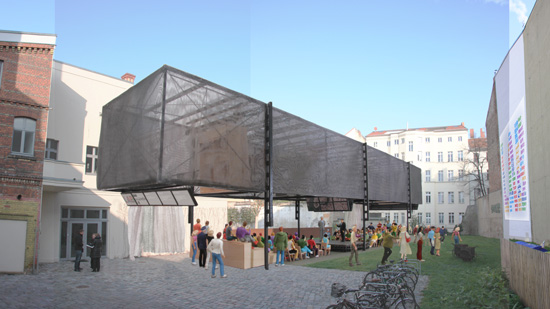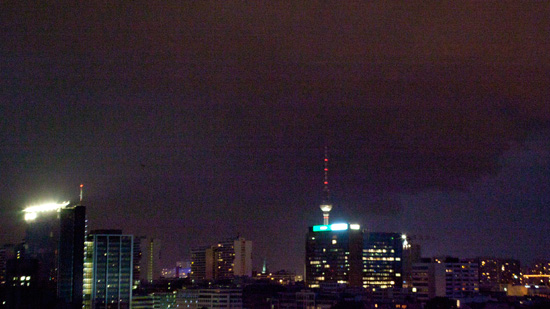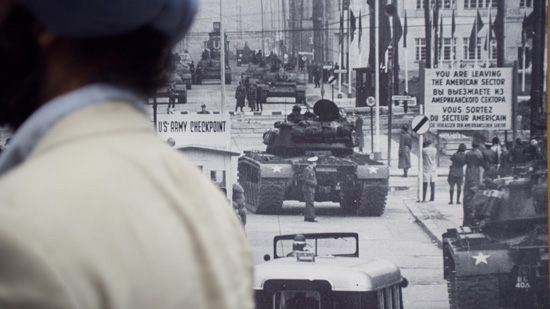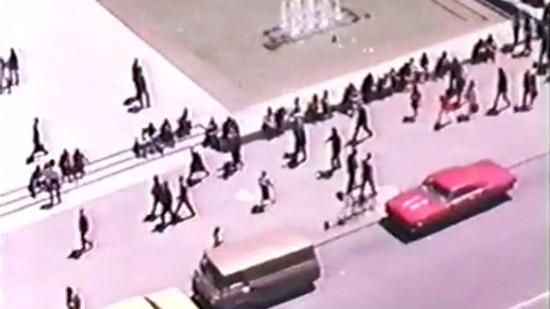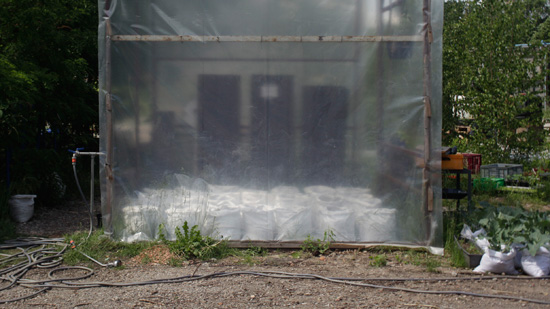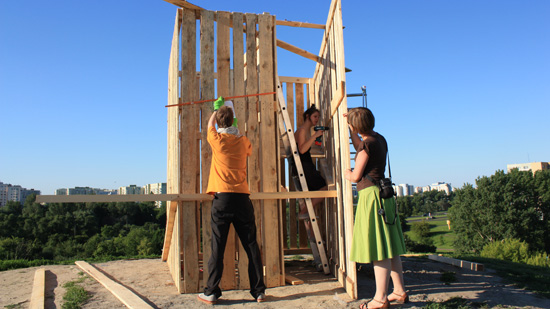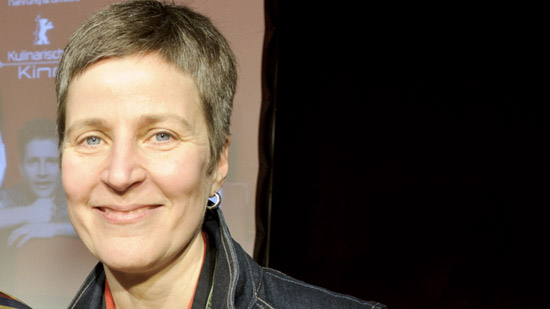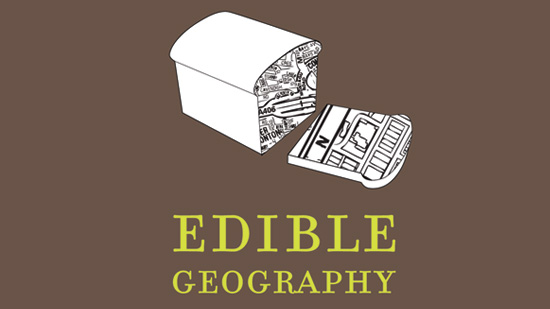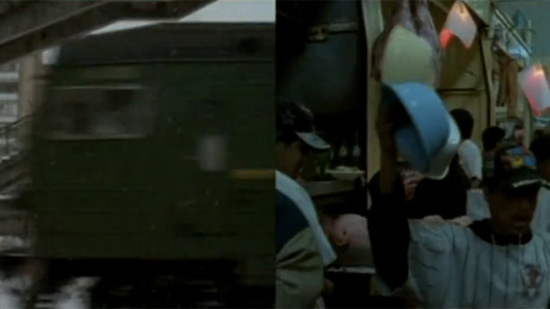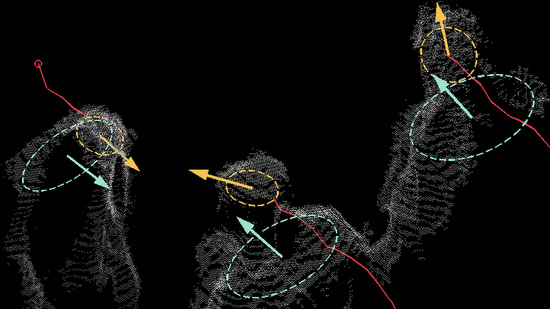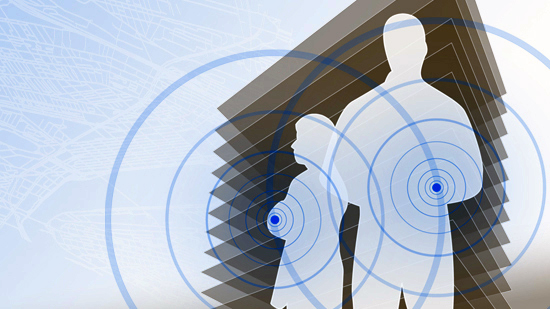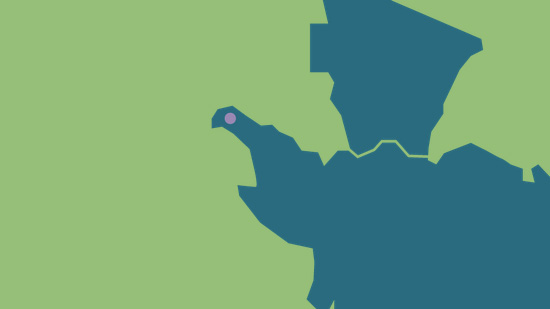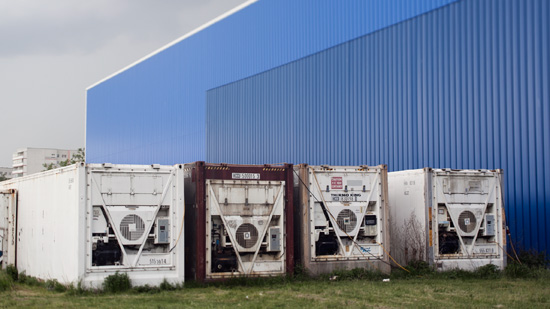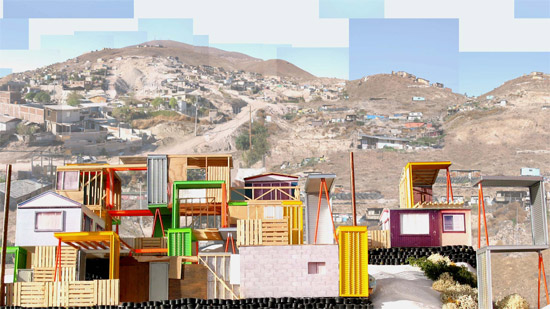The Senseable City Die sensorgesteuerte Stadt
Carlo Ratti explores how new technologies are transforming the way we understand, design, and ultimately live in cities. Carlo’s programs will explore different dimensions—including how we sense and act on our built environment, and how the latter then responds to us—as a way toward merging the digital and the physical realms.
Carlo Ratti untersucht, wie neue Technologien unser Verständnis, das Design und unsere Lebensweise in Städten beeinflussen. Carlo eröffnet verschiedene Dimensionen. Er wird zum Beispiel demonstrieren, wie wir auf unser Stadtumfeld reagieren – und wie dieses auf uns reagieren kann, als neue Möglichkeit physische und digitale Realität verschmelzen zu lassen.
-
Thursday, July 19 — Topic: Thema: Sanitary Cities Gesunde Stadt
Cities are often metaphorically compared to a living being. They have a personality; they have arteries through which traffic circulates; their parks are “green lungs”; and their fingers reach out deep into the hinterlands. Cities also have a metabolism—they consume material and produce waste, which is often transported over vast distances before it reaches its final destination.
Städte werden oft mit einem Lebewesen verglichen. Sie haben eine Persönlichkeit, Adern, durch die der Verkehr fließt, ihre Parks sind „grüne Lungen“ und ihre Finger reichen bis tief ins Hinterland. Städte haben auch einen Kreislauf – sie konsumieren Material und produzieren Müll, der oftmals weit wegtransportiert wird, bevor er sein Ziel erreicht.
-
Jul 19 at 10:30 am
This City Life: Through the Eyes of Children Das Stadtleben: Durch Kinderaugen
While most children live in cities today, understanding, questioning and experimenting with the urban environment is rare. This workshop facilitated by Cameron Stevens proposes one way of encouraging children and young people to engage with their immediate urban surroundings.
Obwohl die meisten Kinder in Städten aufwachsen, ist die Auseinandersetzung und das Experimentieren mit der städtischen Umwelt in ihrer schulischen Ausbildung unterrepräsentiert. Cameron Stevens leitet eine Workshopserie, die Kindern und Jugendlichen eine vielfältige Auseinandersetzung mit ihrem städtischen Umfeld ermöglicht.
-
Jul 19 at 12 pm
Chen School for Taijiquan, Qi Gong and Meditation Chen-Schule für Taijiquan, Qi Gong und Meditation
The complexity of city life often leaves us little time to stop, think, and connect with ourselves. Come to the Lab and let Swanhild Maaß (Chen School for Taijiquan) introduce you to the Chinese practice of meditation, movement patterns, and martial art.
Die Hektik des Stadtlebens lässt uns oft wenig Zeit innezuhalten, nachzudenken und uns unserer selbst bewusst zu werden. Lassen Sie sich von Swanhild Maaß von der Chen-Schule für Taijiquan in die Welt der chinesischen Meditation, Bewegungsformen und Kampfsportart einführen.
-
Jul 19 at 12 pm
Cycling Lessons for Women (Beginners) Fahrradkurs für Frauen (Anfänger)
Cycling enables us to experience a new kind of mobility. Take part in a free cycling workshop for women that aims to foster self-confidence and engagement in daily life.
Fahrradfahren ermöglicht uns eine neue Art der Mobilität zu erfahren. Mach mit bei einem kostenlosen Fahrradkurs für Frauen, der anstrebt Selbstvertrauen und Einbindung im Alltag zu fördern.
-
Jul 19 at 2 pm
Like living beings, cities consume material and produce waste. Lab Team member Carlo Ratti introduces the topic of the day: Sanitary Cities and the Senseable City.
Wie ein Lebewesen konsumieren Städte Material und produzieren Müll. Lab-Team-Mitglied Carlo Ratti stellt das Thema des Tages vor: Gesunde Städte und die Spürbare Stadt.
-
Jul 19 at 3 pm
Dissected Trash Objects Sezierte Müllobjekte
Join in as we collaboratively confront our own trash by dismantling and analyzing individual pieces of locally sourced trash with the help of scales, barcode readers, open-source databases, and waste-management data.
Begleite uns dabei wie wir gemeinsam unserem eigenen Abfall gegenüberstehen und einzelne Teile des örtlichen Abfalls mit Hilfe von Waagen, Barcode-Scannern, Open-Source Datenbanken und Abfall-Management-Daten auseinandernehmen und analysieren.
-
Jul 19 at 3 pm
Soupermobile: Build a Dumpster Kitchen Soupermobile: Bauen Sie eine Müllcontainer-Küche
Convert a trash receptacle into a functional kitchen in this two-day workshop.
In diesem zweitaegigen workshop entwickeln wir eine funktionale Küche aus normalem Abfall.
-
Jul 19 at 8 pm
Can Infrastructure Be Crowdsourced? Kann Infrastruktur durch die Masse selbst organisiert sein?
What if waste collection was put in the hands of citizens? Dietmar Offenhuber explores the possibilities and limitations of self-organized urban infrastructure.
Was wäre, wenn die Müllabfuhr von den Bürgern übernommen würde? Dietmar Offenhuber erforscht die Möglichkeiten und Grenzen selbstorganisierter, urbaner Infrastruktur.
-
Friday, July 20 — Topic: Thema: Open-Source Cities Open-Source Städte
The notion of an “organic city” that is the result of a bottom-up building process by citizens instead of grand, top-down urban design is as old as the planning profession itself and has fascinated writers such as Camillo Sitte, Christopher Alexander, and Bernard Rudolfsky. The success of open-source software development has given these ideas new buoyancy. Can we draw lessons from Linux development for urban development? Can we compare the way we deal with land—a scarce resource—to how we deal with ideas?
Die Idee einer „organisch gewachsenen Stadt“, die sich aus einem von den Bürgern initiierten Bauprozess und nicht aus weitgreifender, „aufgezwungener“ Städteplanung entwickelt hat, ist so alt wie die Stadtplanung selbst und hat seit jeher Schriftsteller wie Camillo Sitte, Christopher Alexander und Bernard Rudolfsky fasziniert. Der Erfolg der Open-Source-Softwareentwicklung gab diesen Ideen neuen Schwung. Können wir die Linux-Entwicklung als Vorbild für urbane Entwicklung nutzen? Können wir die Art unseres Umgangs mit Land – einer knappen Ressource – mit der Art unseres Umgangs mit Ideen vergleichen?
-
Jul 20 at 12 pm
Chen School for Taijiquan, Qi Gong and Meditation Chen-Schule für Taijiquan, Qi Gong und Meditation
The complexity of city life often leaves us little time to stop, think, and connect with ourselves. Come to the Lab and let Swanhild Maaß (Chen School for Taijiquan) introduce you to the Chinese practice of meditation, movement patterns, and martial art.
Die Hektik des Stadtlebens lässt uns oft wenig Zeit innezuhalten, nachzudenken und uns unserer selbst bewusst zu werden. Lassen Sie sich von Swanhild Maaß von der Chen-Schule für Taijiquan in die Welt der chinesischen Meditation, Bewegungsformen und Kampfsportart einführen.
-
Jul 20 at 2 pm
Open-Source Cities Open-Source Städte
Can we apply the success of open-source software to urban development? Lab Team member Carlo Ratti introduces the topic of the day: Open-Source Cities.
Können wir den Erfolg von Open-Source-Software auf urbane Entwicklung übertragen? Lab-Team-Mitglied Carlo Ratti stellt das Thema des Tages vor: Open-Source-Städte.
-
Jul 20 at 2:30 pm
How do cities inform our physical being and expression? Join the BodyCartography Project to engage with the social and physical environments of Berlin from the perspective of your own senses.
Auf welche Weise beeinflussen uns Städte auf körperlicher und emotionaler Ebene? Mach mit beim BodyCartography-Projekt und setze dich mit der sozialen und physischen Umgebung Berlins aus der Perspektive deiner eigenen Sinne auseinander.
-
Jul 20 at 2:30 pm
Testing, Testing! Berlin Testing, Testing! Berlin
Join us for a participatory tour through Mitte and Prenzlauer Berg that positions you as the researcher, measuring the effects of the city on your own brain and body
Unternehmt mit uns einen auf Mitbestimmung ausgerichteten Ausflug durch Berlin-Mitte und Prenzlauer Berg und agiert als Forscher, der die Auswirkungen der Stadt auf den eigenen Geist und Körper misst.
-
Jul 20 at 3 pm
Soupermobile: Build a Dumpster Kitchen Soupermobile: Bauen Sie eine Müllcontainer-Küche
Convert a trash receptacle into a functional kitchen in this two-day workshop.
In diesem zweitaegigen workshop entwickeln wir eine funktionale Küche aus normalem Abfall.
-
Jul 20 at 4:30 pm
Thomas Bratzke: City of Names Thomas Bratzke: City of Names
Sculptor and performer Thomas Bratzke speaks on City of Names, a unique structure in Kreuzberg that was built and inhabited in 2005 by a group of about forty international graffiti writers.
Bildhauer und Performer Thomas Bratzke erzählt über City of Names, ein einzigartiger Aufbau in Kreuzberg, der 2005 durch eine Gruppe von internationalen Graffiti-Writern gebaut und bewohnt wurde.
-
Jul 20 at 8 pm
Can open-source design be applied to architecture and urbanism? Join Joseph Grima, editor-in-chief of Domus, and Lab Team member Carlo Ratti for a conversation about the future of open-source architecture.
Kann Open-Source-Design auf Architektur und Stadtplanung angewendet werden? Erlebe Joseph Grima, Chefredakteur von Domus, und Lab-Team-Mitglied Carlo Ratti in einer Diskussion über die Zukunft der Open-Source-Architektur.
-
Saturday, July 21 — Topic: Thema: Urban Speculation Urbane Spekulation
Urban Speculation is dedicated to new visual perspectives on the city facilitated by computer vision, computational photography, and the ubiquitous proliferation of image sensors in all kinds of devices. Based on cutting-edge imaging techniques, we will explore a new visual logic of the city.
Urbane Spekulation widmet sich den neuen visuellen Perspektiven auf die Stadt, die sich durch Computeransichten, Handybilder und die allgegenwärtige Zunahme von Bildsensoren in allen Arten von Geräten bieten. Basierend auf hochmodernen Bildgebungstechniken werden wir eine neue visuelle Struktur der Stadt erforschen.
-
Jul 21 at 10:30 am
Build your own outdoor gym and work out with us every weekend. Together we’ll turn the Lab and its entire urban environment into a place for training.
Baue dein eigenes Outdoor-Fitnessstudio und trainiere jedes Wochenende mit uns! Gemeinsam bauen wir das Lab, den Pfefferberg und die ganze Stadt zum Trainingsort um.
-
Jul 21 at 12 pm
Urban Speculation Urbane Spekulation
Lab Team Member Carlo Ratti introduces the topic of the day: Urban Speculation.
Lab-Team-Mitglied Carlo Ratti stellt das Thema des Tages vor: Urbane Spekulation.
-
Jul 21 at 12:30 pm
Infoscape Listening investigates the invisible electromagnetic networks that surround us and shows us how a simple device can make such signals audible.
Infoscape Listening untersucht die unsichtbaren elektromagnetischen Netzwerke, die uns umgeben und zeigt uns, wie einfache Geräte solche Signale hörbar machen können.
-
Jul 21 at 1 pm
Field Trips: Clubs Field Trips: Clubs
Field Trips is an itinerant lecture series that serves as a platform for collective exploration and knowledge sharing by physically engaging with the city. Visit residents of Berlin in their homes, workplaces, and other unconventional settings for a variety of unique talks. Today’s topic: Clubs.
Field Trips ist eine wandernde Vortragsreihe, die als Plattform für gemeinschaftliche Entdeckungen und Wissensaustausch durch direkten Kontakt mit der Stadt agiert. Besuchen Sie mit uns Berlins Bewohner zu Hause, auf ihren Arbeitsplätzen und in anderen ungewöhnlichen Umgebungen für eine Vielfalt einzigartiger Gespräche. Thema heute: Klubs.
-
Jul 21 at 4 pm
Join us for a workshop with Raumtaktik–Office from a Better Future to investigate the future of urban and rural environments.
Begleite uns in einem Workshop mit Raumtaktik - Office for a Better Future, um die Zukunft von urbanen und ländlichen Umgebungen zu untersuchen.
-
Sunday, July 22 — Topic: Thema: Scripted Spaces Scripted Spaces
Lab Team Member Carlo Ratti introduces the topic of the day, Scripted Spaces. This term, originally coined by Norman Klein, refers to the narratives that take place in the urban environment. Today we look at the question of who creates these narratives and the process through which they emerge.
Lab Teammitglied Carlo Ratti stellt das Thema des Tages vor: Scripted Spaces. Dieser Begriff wurde ursprünglich von Norman Klein geprägt und verweist auf Narrationen, die sich in urbanem Umfeld entfalten. An diesem Tag betrachten wir die Frage, wer gestaltet diese Narrationen und den Prozess, durch den sie entstehen.
-
Jul 22 at 10:30 am
Build your own outdoor gym and work out with us every weekend. Together we’ll turn the Lab and its entire urban environment into a place for training.
Baue dein eigenes Outdoor-Fitnessstudio und trainiere jedes Wochenende mit uns! Gemeinsam bauen wir das Lab, den Pfefferberg und die ganze Stadt zum Trainingsort um.
-
Jul 22 at 12 pm
Urbanophil: Mobile University of Berlin Urbanophil: Mobile Universität Berlin: Phantom
Join a weekly walking tour that brings learning out of the classroom and into the streets. Led by members of Urbanophil and mikromakro, the Mobile University of Berlin provokes participants to mine their urban environment through acting, mapping, and multimedia.
Nimm an einem wöchentlich stattfindenden Rundgang teil, der das Lernen aus dem Kontext des Klassenzimmers löst und auf der Straße erlebbar macht. Von Urbanophil- und mikromakro-Mitgliedern angeleitet, fordert die Mobile Universität Berlin die Teilnehmer heraus, ihre urbane Umgebung durch Schauspiel, Mapping und Multimedia zu ergründen.
-
Jul 22 at 12 pm
Scripted Spaces Scripted Spaces
Lab Team Member Carlo Ratti introduces the topic of the day, Scripted Spaces. This term, originally coined by Norman Klein, refers to the narratives that take place in the urban environment. Today we look at the question of who creates these narratives and the process through which they emerge.
Lab Teammitglied Carlo Ratti stellt das Thema des Tages vor: Scripted Spaces. Dieser Begriff wurde ursprünglich von Norman Klein geprägt und verweist auf Narrationen, die sich in urbanem Umfeld entfalten. An diesem Tag betrachten wir die Frage, wer gestaltet diese Narrationen und den Prozess, durch den sie entstehen.
-
Jul 22 at 12:30 pm
Join the Poiesis Fellows as they share material from work on cybernetics, environmental visualization, and smart city development in locations from Asia to the Americas. Explore the infrastructures of measurement, technology, algorithms, and probability that make data beautiful, visible, and valuable.
Nehmen Sie an einem Gespräch mit den Poiesis Fellows vom Institute for Public Knowledge an der New York University teil. Dabei geht es um die Visualisierung von Daten und Infrastrukturen von Messvorgängen, Technologien, Algorithmen und Wahrscheinlichkeiten, die Daten schön, sichtbar und wertvoll machen.
-
Jul 22 at 4 pm
Cold War Center: Checkpoint Charlie Cold War Center: Checkpoint Charlie
One of Berlin's most important memorial sites is the former “Checkpoint Charlie.” Berliners mostly agree that, twenty years after the fall of the Berlin Wall, this site is not taken care of in a way that enables it to serve as an appropriate memorial. We invite citizens to join us in the discussion which will be held at Lab.
Eine von Berlins wichtigsten Gedenkstätten ist der frühere “Checkpoint Charlie.” Berliner sind sich meist einig, dass dieses Mahnmal, zwanzig Jahre nach dem Fall der Berliner Mauer, nicht in einer Weise gepflegt wird, die es ihm ermöglicht angemessen zu dienen. Wir laden Bürger ein, an der Diskussion, die im Lab gehalten wird, teilzunehmen.
-
Jul 22 at 8 pm
Screening: The Social Life of Small Urban Spaces Film: The Social Life of Small Urban Spaces
View the classic urban-planning documentary The Social Life of Small Urban Spaces (William H. Whyte, USA, 58 min.), based on the book of the same name, that explores open, public spaces in cities and how people use them.
Schaue dir die klassische Dokumentation über Stadtplanung The Social Life of Small Urban Spaces (William H. Whyte, USA, 58 min.) an, die auf dem gleichnamigen Buch basiert, das öffentliche, freizugängliche Räume in Städten erforscht und darlegt wie Menschen sie nutzen.
-
Wednesday, July 25 — Topic: Thema: Edible Geographies Genießbare Geografie
Often the urban geography of food does not match the traditional logic of space. Food deserts—areas with insufficient access to healthy, diverse, and affordable food—can be found in affluent parts of downtowns and suburbs, but also in areas of low socioeconomic status. We will examine the edible geography of Berlin, reflect on how the culture of food defines a place, and rethink the taste of a neighborhood through the possibilities offered by local resources.
Oft entspricht die urbane Geografie der Lebensmittelverteilung nicht der traditionellen Logik von Raum. Ernährungswüsten – Bereiche mit unzureichendem Zugang zu gesunden, abwechslungsreichen und erschwinglichen Lebensmitteln – finden sich in vielen Bereichen der Innen- und Vorstädte, jedoch auch in Gebieten mit niedrigem sozioökonomischem Status. Wir untersuchen die genießbare Geografie von Berlin, überlegen uns, wie die Kultur des Essens einen Ort definiert, und überdenken den „Geschmack“ eines Viertels durch Möglichkeiten lokaler Ressourcen neu.
-
Jul 25 at 2 pm
Edible Geographies Genießbare Geografie
Join us to discuss food culture and the city as Lab Team member Carlo Ratti introduces the topic of the day: Edible Geographies.
Diskutiere mit uns über Essenskultur und die Stadt während Lab-Team-Mitglied Carlo Ratti das Thema des Tages vorstellt: Genießbare Geografie.
-
Jul 25 at 2 pm
Cycling Lessons for Women (Beginners) Fahrradkurs für Frauen (Anfänger)
Cycling enables us to experience a new kind of mobility. Take part in a free cycling workshop for women that aims to foster self-confidence and engagement in daily life.
Fahrradfahren ermöglicht uns eine neue Art der Mobilität zu erfahren. Mach mit bei einem kostenlosen Fahrradkurs für Frauen, der anstrebt Selbstvertrauen und Einbindung im Alltag zu fördern.
-
Jul 25 at 2:15 pm
Design-Build: Learning by Doing
Take part in a compact building experiment where visitors have the chance to collectively conceive of, prepare plans for, and build a temporary outdoor structure over a period of only four days.
Mach mit bei einem kompakten Bauexperiment, bei dem Besucher die Möglichkeit haben innerhalb von nur vier Tagen ein Konzept und Pläne für eine temporäre Outdoor-Struktur zu erstellen und diese dann zu bauen.
-
Jul 25 at 2:30 pm
Bread: A Window on Berlin's History and Food Habits from the Late 1700s to Today
In this talk, independent scholar and food historian Ursula Heinzelmann will use bread as a lens through which to explore the historical context and more recent past of Berlin. A tasting of different breads from Balzer, in Mitte, Soluna, in Kreuzberg, and Weichardt, in Wilmersdorf follows.
In dieser Gesprächsrunde wird die unabhängige Wissenschaftlerin und Ernährungshistorikerin Ursula Heinzelmann Brot als Objektiv einsetzen, um den historischen Kontext und die jüngste Vergangenheit Berlins zu beleuchten. Eine Verkostung der unterschiedlichen Brote aller drei Bäckereien – Balzer aus Mitte, Soluna aus Kreuzberg und Weichardt aus Wilmersdorf schließt sich dem Gespräch an.
-
Jul 25 at 4 pm
Foodscape Mapping Foodscape Mapping
Take a whirlwind visual tour of cities around the world as seen through their cupcake shops, ghost orchards, fast-food restaurant distribution, and chewing-gum deposits.
Begebe dich auf eine aufregende visuelle Reise zu Städten in aller Welt und lerne sie durch ihre Bäckereien, einsamen Obstgärten, Fast-Food-Restaurants und Kaugummiautomaten kennen.
-
Jul 25 at 8 pm
Screening: Megacities Film: Megacities
Michael Glawogger’s Megacities tells stories of survival in four megacities around the world: Mumbai, Mexico City, Moscow, and New York.
Michael Glawogger’s Megacities erzählt Geschichten vom Überleben in vier Megastädten verteilt auf der ganzen Welt: Mumbai, Mexico Stadt, Moskau und New York.
-
Thursday, July 26 — Topic: Thema: Open Governance Open Governance
How have digital networks transformed the way we organize cities? How can technology be used to stimulate a more participatory civic body? Today we discuss new models for governance that challenge the traditional practice of top-down bureaucracies; models that leverage recent design and technological developments for creating a more transparent and collaborative local government.
Wie haben digitale Netzwerke unsere Organisation von Städten verändert? Wie kann Technik genutzt werden, um eine höhere Beteiligung der Bevölkerung anzuregen? Heute sprechen wir über neue Formen der Regierungsführung, die die traditionelle Staatsverwaltung von oben nach unten in Frage stellen – Formen, die die jüngsten Design- und Technikentwicklungen einbeziehen, um eine transparentere und gemeinschaftlichere lokale Verwaltung zu schaffen.
-
Jul 26 at 10:30 am
This City Life: Through the Eyes of Children Das Stadtleben: Durch Kinderaugen
While most children live in cities today, understanding, questioning and experimenting with the urban environment is rare. This workshop facilitated by Cameron Stevens proposes one way of encouraging children and young people to engage with their immediate urban surroundings.
Obwohl die meisten Kinder in Städten aufwachsen, ist die Auseinandersetzung und das Experimentieren mit der städtischen Umwelt in ihrer schulischen Ausbildung unterrepräsentiert. Cameron Stevens leitet eine Workshopserie, die Kindern und Jugendlichen eine vielfältige Auseinandersetzung mit ihrem städtischen Umfeld ermöglicht.
-
Jul 26 at 12 pm
Chen School for Taijiquan, Qi Gong and Meditation Chen-Schule für Taijiquan, Qi Gong und Meditation
The complexity of city life often leaves us little time to stop, think, and connect with ourselves. Come to the Lab and let Swanhild Maaß (Chen School for Taijiquan) introduce you to the Chinese practice of meditation, movement patterns, and martial art.
Die Hektik des Stadtlebens lässt uns oft wenig Zeit innezuhalten, nachzudenken und uns unserer selbst bewusst zu werden. Lassen Sie sich von Swanhild Maaß von der Chen-Schule für Taijiquan in die Welt der chinesischen Meditation, Bewegungsformen und Kampfsportart einführen.
-
Jul 26 at 12 pm
Cycling Lessons for Women (Beginners) Fahrradkurs für Frauen (Anfänger)
Cycling enables us to experience a new kind of mobility. Take part in a free cycling workshop for women that aims to foster self-confidence and engagement in daily life.
Fahrradfahren ermöglicht uns eine neue Art der Mobilität zu erfahren. Mach mit bei einem kostenlosen Fahrradkurs für Frauen, der anstrebt Selbstvertrauen und Einbindung im Alltag zu fördern.
-
Jul 26 at 2:15 pm
Design-Build: Learning by Doing
Take part in a compact building experiment where visitors have the chance to collectively conceive of, prepare plans for, and build a temporary outdoor structure over a period of only four days.
Mach mit bei einem kompakten Bauexperiment, bei dem Besucher die Möglichkeit haben innerhalb von nur vier Tagen ein Konzept und Pläne für eine temporäre Outdoor-Struktur zu erstellen und diese dann zu bauen.
-
Jul 26 at 2:30 pm
Dynamic Public Spaces Dynamische öffentliche Orte
Join the MIT SENSEable City Lab to experiment with altering public space and to witness the effects. Learn about how people move, talk, and interact in public space—and how this information can lead to better design for public spaces.
Mach mit beim MIT SENSEable City Lab und experimentiere mit Veränderungen im öffentlichen Bereich und erlebe die Auswirkungen mit. Erfahre, wie sich Menschen im öffentlichen Bereich bewegen, wie sie sprechen und sich austauschen – und wie diese Informationen zur Schaffung einer besseren Gestaltung öffentlicher Bereiche beitragen können.
-
Jul 26 at 5 pm
Join us for a tour and concert with GDR civil rights activist and musician Ekkehard Maaß and take a journey through the history of East Berlin.
Begleiten Sie auf dieser Tour mit Konzert Ekkehard Maaß auf eine Zeitreise zurück nach Ost-Berlin. Der DDR-Bürgerrechtler und Musiker wird im Lab eine Einführung geben und die Teilnehmer danach zu einem Besuch in seinen Salon einladen, wo sich - hinter dem Eisernen Vorhang - DDR Künstler und Dissidenten trafen.
-
Jul 26 at 8 pm
Take part in a discussion about the influence of new technology on our communication and decision-making processes. Topics include data and visualization, activism and art, and transparency and responsibilit.
Nehmen Sie an einer Diskussion über den Einfluss neuer Technologien auf unsere Kommunikations- und Entscheidungsprozesse teil. Themenfelder dieser Veranstaltung sind Datensammlungen und deren Visualisierung, Aktivismus und Kunst, Transparenz und Verantwortung.
-
Friday, July 27 — Topic: Thema: Sense and the City Sense and the City
Maps and plans show the city as a geometric pattern in Euclidean space, in which shapes and distances are nonambiguous. However, in our daily lives we experience cities differently. The way we perceive the city is based on its sensory qualities and on our own cultural preconceptions. Explore how new technologies are transforming the way we understand, design, and ultimately live in cities.
Karten und Pläne zeigen die Stadt als geometrisches Muster im euklidischen Raum, in dem Formen und Entfernungen klar sind. In unserem Alltag erleben wir Städte jedoch anders. Unsere Wahrnehmung der Stadt basiert auch auf ihren sensorischen Eigenschaften und unserer eigenen vorgefassten Meinung. Entdecken Sie, wie neue Techniken unser Verständnis, das Design und schlussendlich auch unser Leben in den Städten verändern.
-
Jul 27 at 12 pm
Chen School for Taijiquan, Qi Gong and Meditation Chen-Schule für Taijiquan, Qi Gong und Meditation
The complexity of city life often leaves us little time to stop, think, and connect with ourselves. Come to the Lab and let Swanhild Maaß (Chen School for Taijiquan) introduce you to the Chinese practice of meditation, movement patterns, and martial art.
Die Hektik des Stadtlebens lässt uns oft wenig Zeit innezuhalten, nachzudenken und uns unserer selbst bewusst zu werden. Lassen Sie sich von Swanhild Maaß von der Chen-Schule für Taijiquan in die Welt der chinesischen Meditation, Bewegungsformen und Kampfsportart einführen.
-
Jul 27 at 2 pm
Sense and the City Sinn und die Stadt
Lab Team member Carlo Ratti introduces the topic of the day: Sense and the City. Explore how new technologies are transforming the way we live in cities.
Lab-Mitglied Carlo Ratti stellt das Thema des Tages vor: Sense and the City. Entdecke, wie neue Techniken unser Leben in den Städten verändern.
-
Jul 27 at 2:15 pm
Design-Build: Learning by Doing
Take part in a compact building experiment where visitors have the chance to collectively conceive of, prepare plans for, and build a temporary outdoor structure over a period of only four days.
Mach mit bei einem kompakten Bauexperiment, bei dem Besucher die Möglichkeit haben innerhalb von nur vier Tagen ein Konzept und Pläne für eine temporäre Outdoor-Struktur zu erstellen und diese dann zu bauen.
-
Jul 27 at 2:30 pm
Dynamic Public Spaces Dynamische öffentliche Orte
Join the MIT SENSEable City Lab to experiment with altering public space and to witness the effects. Learn about how people move, talk, and interact in public space—and how this information can lead to better design for public spaces.
Mach mit beim MIT SENSEable City Lab und experimentiere mit Veränderungen im öffentlichen Bereich und erlebe die Auswirkungen mit. Erfahre, wie sich Menschen im öffentlichen Bereich bewegen, wie sie sprechen und sich austauschen – und wie diese Informationen zur Schaffung einer besseren Gestaltung öffentlicher Bereiche beitragen können.
-
Jul 27 at 2:30 pm
Testing, Testing! Berlin Testing, Testing! Berlin
Join us for a participatory tour through Mitte and Prenzlauer Berg that positions you as the researcher, measuring the effects of the city on your own brain and body
Unternehmt mit uns einen auf Mitbestimmung ausgerichteten Ausflug durch Berlin-Mitte und Prenzlauer Berg und agiert als Forscher, der die Auswirkungen der Stadt auf den eigenen Geist und Körper misst.
-
Saturday, July 28 — Topic: Thema: Temporary Architecture Architektur auf Zeit
How would our society look if buildings were not permanent—if they could break apart every few months? What would be the consequences for ownership? Would our cities be better if we could quickly undo the physical consequences of bad decisions? Temporary Architecture will examine structures that are meant to exist only for a limited amount of time.
Wie würde unsere Gesellschaft aussehen, wenn Gebäude nicht auf Dauer existierten und alle paar Monate abgebaut werden würden? Wie würde sich dies auf das Konzept Eigentum auswirken? Wären unsere Städte besser, wenn wir die tatsächlichen Folgen schlechter Entscheidungen schnell rückgängig machen könnten? Architektur auf Zeit untersucht Strukturen, deren Lebensdauer nur auf eine begrenzte Zeit angelegt ist.
-
Jul 28 at 1 pm
Field Trips: Safari Field Trips: Safari
Field Trips is an itinerant lecture series that serves as a platform for collective exploration and knowledge sharing by physically engaging with the city. Visit residents of Berlin in their homes, workplaces, and other unconventional settings for a variety of unique talks. Today’s topic: Safari.
Field Trips ist eine wandernde Vortragsreihe, die als Plattform für gemeinschaftliche Entdeckungen und Wissensaustausch durch direkten Kontakt mit der Stadt agiert. Besuchen Sie mit uns Berlins Bewohner zu Hause, auf ihren Arbeitsplätzen und in anderen ungewöhnlichen Umgebungen für eine Vielfalt einzigartiger Gespräche. Thema heute: Safari.
-
Jul 28 at 2 pm
Temporary Architecture Architektur auf Zeit
How would our society look if buildings were made to exist only for a limited amount of time? Lab Team member Carlo Ratti introduces the topic of the day: Temporary Architecture.
Wie sähe unsere Gesellschaft aus, wenn Gebäude nur für einen festgelegten Zeitraum bestehen würden? Lab-Team-Mitglied Carlo Ratti stellt das Thema des Tages vor: Architektur auf Zeit.
-
Jul 28 at 2:15 pm
Design-Build: Learning by Doing
Take part in a compact building experiment where visitors have the chance to collectively conceive of, prepare plans for, and build a temporary outdoor structure over a period of only four days.
Mach mit bei einem kompakten Bauexperiment, bei dem Besucher die Möglichkeit haben innerhalb von nur vier Tagen ein Konzept und Pläne für eine temporäre Outdoor-Struktur zu erstellen und diese dann zu bauen.
-
Jul 28 at 8 pm
Temporary Architecture Panel Architektur auf Zeit—die Podiumsdiskussion
What are the advantages of temporary architecture? Join a panel discussion with architectural experts including Teddy Cruz, Estudio Teddy Cruz; Robert Kronenberg, University of Liverpool; Jürgen Mayer H.; Lena Kleinheinz, Magma Architecture; and Peter Fattinger, Design-Build.
Was sind die Vorteile temporärer Architektur? Komm zu einer Podiumsdiskussion mit Architekturexperten wie Teddy Cruz, Estudio Teddy Cruz; Robert Kronenberg, University of Liverpool; Jürgen Mayer H.; Lena Kleinheinz, Magma Architecture; und Peter Fattinger, Design-Build.

